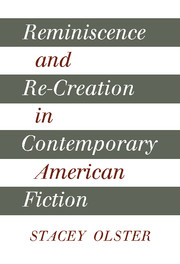Book contents
- Frontmatter
- Contents
- Preface
- Key to Abbreviations
- Reminiscence and Re-Creation in Contemporary American Fiction
- Introduction
- 1 A Disruption of Sensibility
- 2 The Transition to Post-Modernism: Norman Mailer and a New Frontier in Fiction
- 3 Thomas Pynchon: An Interface of History and Science
- 4 John Barth: Clio as Kin to Calliope
- Conclusion: “Subjective Historicism”
- Notes
- Bibliography
- Index
- PERMISSIONS
1 - A Disruption of Sensibility
Published online by Cambridge University Press: 19 March 2010
- Frontmatter
- Contents
- Preface
- Key to Abbreviations
- Reminiscence and Re-Creation in Contemporary American Fiction
- Introduction
- 1 A Disruption of Sensibility
- 2 The Transition to Post-Modernism: Norman Mailer and a New Frontier in Fiction
- 3 Thomas Pynchon: An Interface of History and Science
- 4 John Barth: Clio as Kin to Calliope
- Conclusion: “Subjective Historicism”
- Notes
- Bibliography
- Index
- PERMISSIONS
Summary
“For my part, ” I continued, beneficently seeking to overshadow her with my own sombre humor, “my past life has been a tiresome one enough; yet I would rather look backward ten times than forward once. For, little as we know of our life to come, we may be very sure, for one thing, that the good we aim at will not be attained. People never do get just the good they seek. If it come at all, it is something else, which they never dreamed of, and did not particularly want.”
– Nathaniel Hawthorne, The Blithedale Romance (1852)Only in 1900, the continuity snapped.
–Henry Adams, “The Grammar of Science” (1906)When Henry Adams cited the year 1900 as bringing an end to continuity, he recognized that the year he found pivotal to a nineteenth-century mind was but the latest of such points to leave behind a “historical neck broken” (Education 382). As if to prove his own awareness further, he preceded his mention of 1900 with the mention of other climactic points in time – the year 310 with the fall of the Roman Empire, “towards 1500” after the discovery of the West, “about 1600” with the revelations of Bacon and Galileo (383, 457). Yet in admitting these earlier years as approximations, Adams also recognized that denoting historical cataclysms by specific dates and thunderclap events was merely a matter of convenience.
- Type
- Chapter
- Information
- Publisher: Cambridge University PressPrint publication year: 1989



